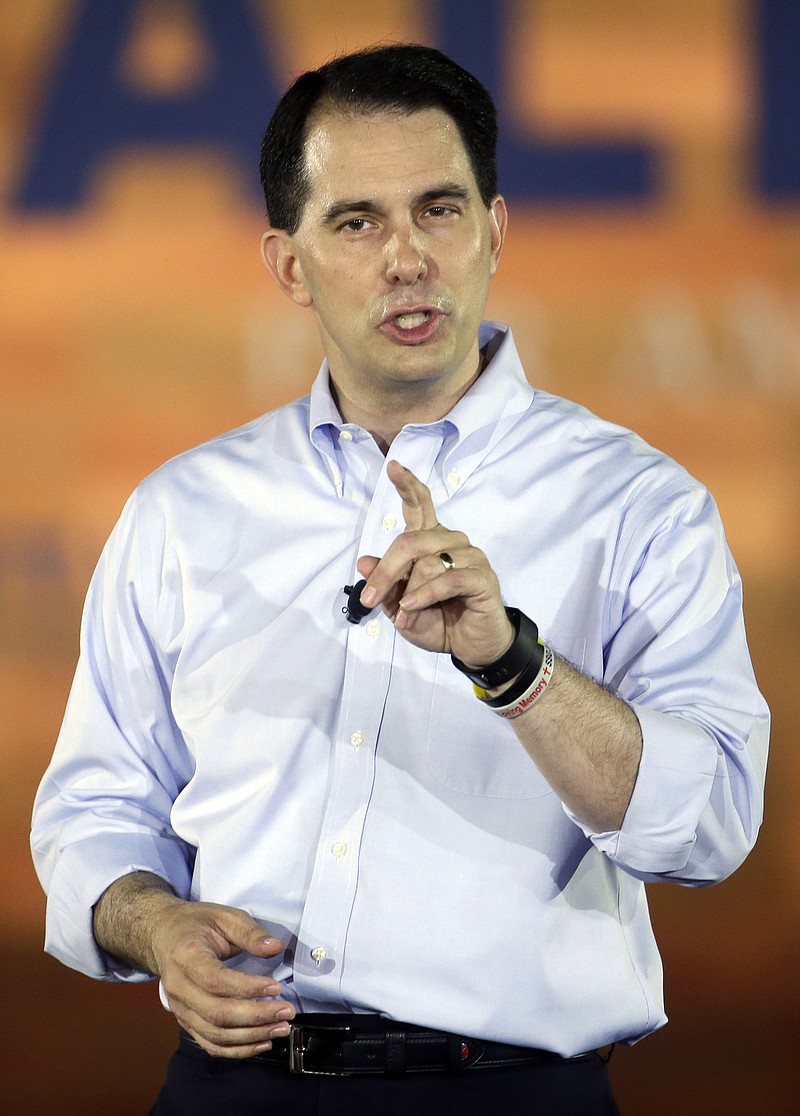MADISON, Wis. (AP) - The Wisconsin Supreme Court's decision to end a so-called John Doe investigation of Gov. Scott Walker's 2012 recall campaign clears a potential obstacle in his Republican presidential bid and has far-reaching implications for the state's campaign finance laws.
Here are some questions and answers about the probe and the effects of the high court's ruling on Thursday:
___
WHAT IS A JOHN DOE INVESTIGATION?
A John Doe probe is Wisconsin's equivalent of a grand jury investigation. The goal is to ascertain whether a crime has been committed. The investigation is overseen by a judge, and witnesses can be compelled to testify in secret. Information that emerges is kept secret.
WHAT WAS THE INVESTIGATION ALL ABOUT?
A group of prosecutors led by Milwaukee County District Attorney John Chisholm, a Democrat, launched the investigation in 2012. It looked into whether Walker's recall campaign earlier that year illegally coordinated with outside conservative groups on issue advocacy: campaign-related advertisements and communications that don't specifically call for a candidate's defeat or election. The prosecutors alleged the groups were working so closely with the campaign that they essentially became campaign subcommittees, triggering requirements in state campaign finance law to report their spending.
WHAT'S THE REASONING BEHIND THE SUPREME COURT'S RULING?
It's complicated. The court's conservative majority found the state's ban on campaigns coordinating with outside groups is so vague it infringes on free-speech rights. The justices scaled the law back, a move that case law allows them to make in an effort to rehabilitate questionable statutes. The justices said the ban on coordination applies only to express advocacy - that is, advertisements and communications that directly call for a named candidate's election or defeat. Under that interpretation, the prosecutors' theory that the groups and Walker's campaign illegally coordinated on issue advocacy falls apart, they said.
WAS THERE ANY DISSENT?
Justice Shirley Abrahamson, one of the court's two liberal-leaning justices, accused the court's conservative majority of adopting an "unprecedented and faulty interpretation" of state campaign finance law and the U.S. Constitution. She said the majority's position amounts to "anything goes" in campaigns and denies the people of Wisconsin the opportunity to see whether the investigation's targets were guilty of violating the law.
WHAT'S THE EFFECT ON WALKER?
The ruling marks a big win for the governor and should smooth his presidential campaign path. No one had been charged in the probe, but questions about it have hung over the governor for months. Now he can campaign in early primary states without concern about the investigation uncovering anything damaging. Prosecutors could still appeal the decision to the U.S. Supreme Court, but it would be months before that court would rule, if it even agreed to take the case.
WHAT DOES THE RULING MEAN FOR WISCONSIN CAMPAIGN FINANCE LAW?
Political observers say the ruling opens the door wide to unlimited coordination between special interest groups and candidates with no government oversight or regulation. Howard Schweber, a University of Wisconsin-Madison political science and legal studies associate professor, said the line between issue advocacy and express advocacy is already thin and the ruling will allow political action committees to run a candidate's campaign without disclosing their spending.
WILL THE PUBLIC GET A CHANCE TO REVIEW THE EVIDENCE SINCE THE INVESTIGATION IS OVER?
No. The secrecy surrounding the John Doe was originally intended to protect the integrity of the investigation. The Supreme Court, though, plans to maintain it even after halting the probe, ordering the return or permanent destruction of all the evidence prosecutors gathered. Abrahamson said the court has already kept too many documents in the case under seal and called keeping the evidence secret unwarranted.
___
Associated Press writers Doug Glass in Minneapolis and Jeff Horwitz in Washington, D.C., contributed to this report.
